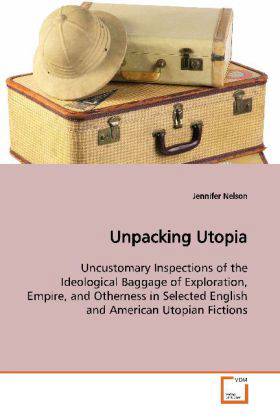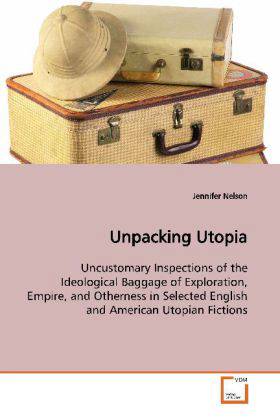
- Afhalen na 1 uur in een winkel met voorraad
- Gratis thuislevering in België vanaf € 30
- Ruim aanbod met 7 miljoen producten
- Afhalen na 1 uur in een winkel met voorraad
- Gratis thuislevering in België vanaf € 30
- Ruim aanbod met 7 miljoen producten
Zoeken
Unpacking Utopia
Uncustomary Inspections of the Ideological Baggage of Exploration, Empire, and Otherness in Selected English and American Utopian Fictions
Jennifer Nelson
Paperback | Engels
€ 77,95
+ 155 punten
Omschrijving
English and American literary utopias often use a
travel narrative frame that presents more than a
simple formula for making their fantastic discoveries
and vicarious estrangements seem as credible,
entertaining, and useful to readers as the
real-life adventures and factual accounts of
exploration these fictions have imitated since
Columbus stumbled upon his "new world." What becomes
of utopianism''s claims to locate intellectual and
speculative resources for human liberation, communal
perfection, and civilized progress in the cultural
properties of imaginary foreigners once its
literature''s productive and restrictive relations to
the imperialist, colonialist, and capitalist
ideologies of so-called Western nations have been
exposed? For literary scholars, cultural
historians, and others interested in studying utopian
fiction''s generic construction from the
romanticizations of alienation and exploitation that
empowered 500 years of Anglophone empire-building,
this book offers its deconstructive analyses of
paradoxical utopia''s parodies of travel and its
discourses.
travel narrative frame that presents more than a
simple formula for making their fantastic discoveries
and vicarious estrangements seem as credible,
entertaining, and useful to readers as the
real-life adventures and factual accounts of
exploration these fictions have imitated since
Columbus stumbled upon his "new world." What becomes
of utopianism''s claims to locate intellectual and
speculative resources for human liberation, communal
perfection, and civilized progress in the cultural
properties of imaginary foreigners once its
literature''s productive and restrictive relations to
the imperialist, colonialist, and capitalist
ideologies of so-called Western nations have been
exposed? For literary scholars, cultural
historians, and others interested in studying utopian
fiction''s generic construction from the
romanticizations of alienation and exploitation that
empowered 500 years of Anglophone empire-building,
this book offers its deconstructive analyses of
paradoxical utopia''s parodies of travel and its
discourses.
Specificaties
Betrokkenen
- Auteur(s):
- Uitgeverij:
Inhoud
- Aantal bladzijden:
- 292
- Taal:
- Engels
Eigenschappen
- Productcode (EAN):
- 9783639132328
- Uitvoering:
- Paperback
- Afmetingen:
- 220

Alleen bij Standaard Boekhandel
+ 155 punten op je klantenkaart van Standaard Boekhandel
Beoordelingen
We publiceren alleen reviews die voldoen aan de voorwaarden voor reviews. Bekijk onze voorwaarden voor reviews.











